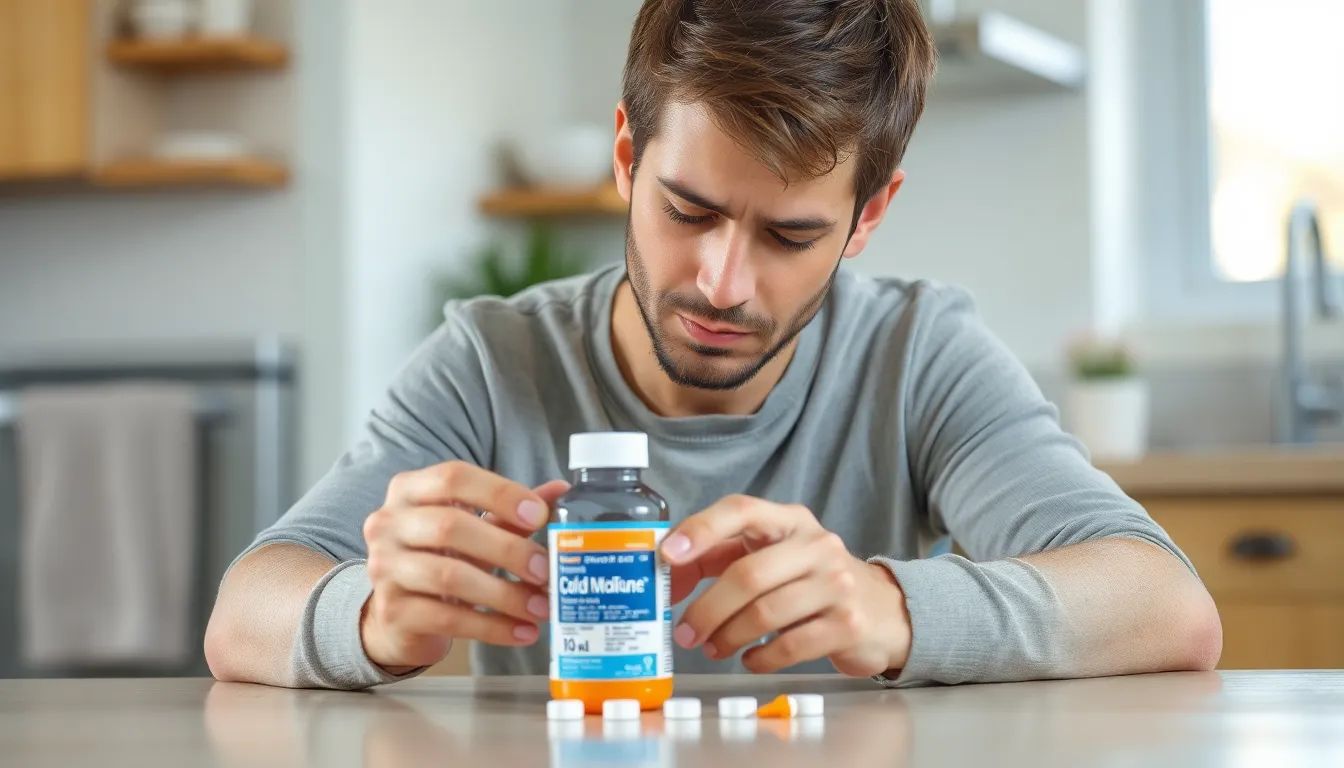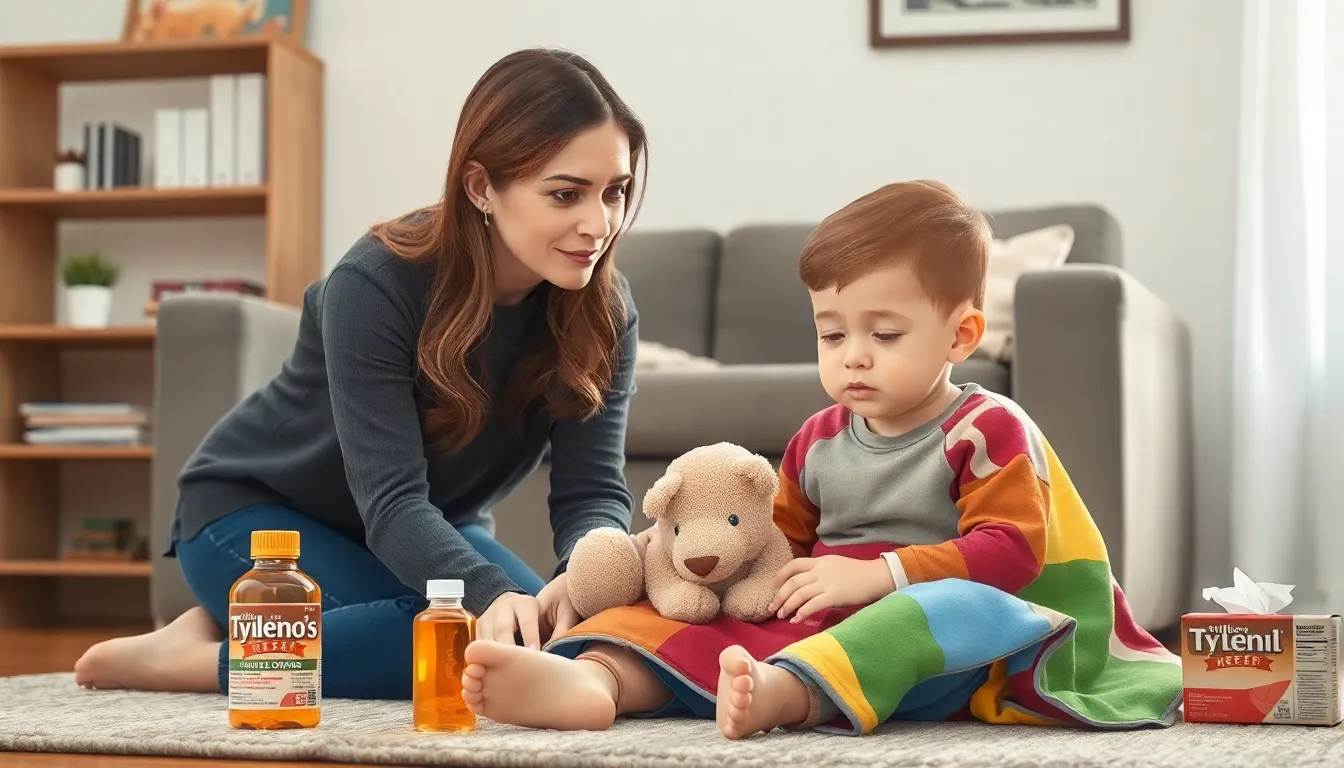When a two-year-old catches a cold, it can feel like a scene from a slapstick comedy—sneezes, coughs, and a whole lot of snot. Parents often find themselves in a whirlwind of tissues and toddler tantrums, desperately searching for relief. But with so many options out there, how do they choose the best cold medicine for their little one?
Table of Contents
ToggleOverview Of Cold Symptoms In Toddlers
Toddlers often display various cold symptoms, making it essential for parents to recognize them. Common signs include a runny or stuffy nose that may lead to discomfort. A persistent cough frequently accompanies nasal congestion, impacting sleep and playtime.
Fever sometimes occurs, signaling the body’s fight against infection. It can range from mild to moderate, generally not exceeding 101°F. Changes in behavior, such as increased irritability or clinginess, may indicate that a child isn’t feeling well.
Sore throats can also manifest during colds, leading to difficulty with swallowing and eating. Children tend to lose their appetite when experiencing these symptoms. Chills and fatigue often add to the overall discomfort, making rest a priority for recovery.
Parents must observe additional symptoms like sneezing or watery eyes, which can signal the presence of a cold. These indicators may vary in severity and duration, typically lasting around 7 to 10 days. Ensuring hydration and comfort is crucial during this time to help support the immune system.
Awareness of these symptoms allows parents to determine when to seek medical advice. Contacting a healthcare provider is advisable if symptoms worsen or persist beyond a week. Monitoring signs and symptoms helps in deciding the most suitable cold medicine for a toddler.
Criteria For Selecting Cold Medicine

Selecting the right cold medicine for a two-year-old requires careful consideration. Parents must prioritize safety and effectiveness for optimal results.
Safety Considerations
Safety is paramount when choosing cold medicine for toddlers. Ensure that the product is specifically labeled for children, indicating it’s suitable for their age group. Ingredients must be scrutinized; avoid medications containing alcohol or artificial dyes. Recommendations from pediatricians often point to non-drowsy formulations for day use. Dosage instructions require strict adherence as overdosing can lead to serious side effects. Checking for potential allergens in the medicine is crucial to avoid unexpected reactions. Parents should also verify the expiration date on the package, ensuring the medication is still safe for use.
Effectiveness
Effectiveness relies on addressing the symptoms a child experiences. Decongestants help relieve nasal congestion, while antihistamines can manage runny noses. Cough suppressants may alleviate persistent coughing, making it easier for toddlers to rest. Choosing medicines with proven active ingredients can lead to quicker symptom relief. Always look for options that provide multi-symptom relief, as multiple issues often arise during a cold. Consulting product reviews or medical professionals can highlight trusted brands and choices. Ultimately, understanding symptom severity helps in selecting the most effective treatment.
Top Recommendations For Cold Medicine
Selecting the right cold medicine for a two-year-old can greatly improve their comfort. Below are some effective options to consider.
Medicine 1: Children’s Tylenol and Benefits
Children’s Tylenol provides relief from fever and pain associated with colds. Acetaminophen, its active ingredient, is safe for toddlers when dosed correctly. Parents appreciate that it’s available in liquid form, making it easy for young ones to swallow. This medicine targets discomfort, allowing children to rest better. Always follow the age-specific dosage on the packaging for safety.
Medicine 2: Robitussin Children’s Cough and Benefits
Robitussin Children’s Cough helps alleviate persistent cough symptoms. Formulated specifically for children, it soothes irritated throats and decreases cough frequency. The pleasant cherry flavor encourages kids to take the medicine without fuss. It’s important to use only the version designated for children, preventing any harmful ingredients that could cause side effects. Monitoring the child’s response assists in determining if the medicine is effective.
Medicine 3: Little Remedies Saline Nasal Spray and Benefits
Little Remedies Saline Nasal Spray effectively relieves nasal congestion. This drug-free solution helps moisten and clear nasal passages, enhancing breathing comfort. Parents find it particularly useful because it contains no harsh chemicals. Administering this spray can ease discomfort during cold symptoms. Regular use during a cold keeps the nose clear and helps children sleep better.
Non-Medicinal Remedies
Non-medicinal remedies can significantly help ease a child’s cold symptoms. Parents may find several effective methods to comfort their two-year-olds.
Home Remedies
Honey serves as a soothing option for cough relief. It can be offered to children older than one year, as it poses risks for younger infants. Warm fluids like herbal teas or broth hydrate and soothe throats. Steamy baths are another alternative, providing moisture that can ease congestion. Saline nasal drops can help clear nasal passages, allowing for easier breathing. These simple home remedies can offer comfort and aid recovery.
Comfort Measures
Rest plays a crucial role in helping toddlers recover from a cold. Creating a calm environment promotes better sleep. Parents might also encourage cuddling or reading together to help soothe their child. Maintaining a humidified room adds moisture to the air, making breathing easier. Frequent handwashing prevents the spread of germs. Overall, implementing these comfort measures can enhance a toddler’s well-being during recovery.
Finding the right cold medicine for a two-year-old can be a daunting task for parents. Prioritizing safety and effectiveness is crucial when navigating the myriad of options available. By selecting age-appropriate products and adhering to dosage guidelines, parents can help alleviate their child’s discomfort.
Combining medicinal treatments with soothing non-medicinal remedies can further support recovery. Staying attentive to symptoms and maintaining open communication with healthcare providers ensures that any concerns are promptly addressed. With the right approach, parents can help their little ones feel better and return to their playful selves in no time.







